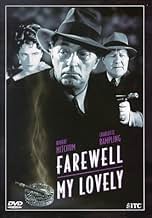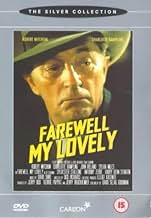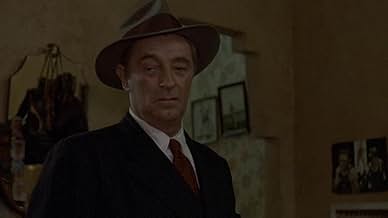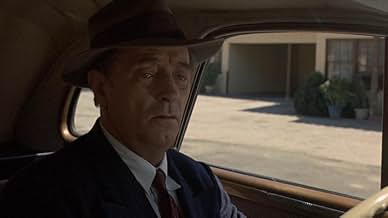IMDb RATING
7.0/10
10K
YOUR RATING
Los Angeles private eye Philip Marlowe is hired by paroled convict Moose Malloy to find his girlfriend Velma, former seedy nightclub dancer.Los Angeles private eye Philip Marlowe is hired by paroled convict Moose Malloy to find his girlfriend Velma, former seedy nightclub dancer.Los Angeles private eye Philip Marlowe is hired by paroled convict Moose Malloy to find his girlfriend Velma, former seedy nightclub dancer.
- Director
- Writers
- Stars
- Nominated for 1 Oscar
- 1 win & 3 nominations total
Jimmy Archer
- Georgie
- (as Jimmie Archer)
- Director
- Writers
- All cast & crew
- Production, box office & more at IMDbPro
Featured reviews
This version of Raymond Chandler's classic detective novel is more faithful to the original book than the 1940s version filmed as 'Murder, My Sweet', and includes some of the racial and sexual aspects that weren't able to be included earlier. However despite being more faithful for me it still isn't as entertaining. And Robert Mitchum in his prime could act Dick Powell off the screen, but unfortunately as good as Mitchum is in this movie it's about twenty years too late for him to play Philip Marlowe. If Mitchum had starred in 'Murder, My Sweet' it would might have been THE definitive 1940s Noir, but comparing the two versions as they stand, Powell beats Mitchum hands down. Even so, there is a lot going for 'Farewell, My Lovely' and it is quite an underrated movie. Mitchum may be too old but he is still compelling, and the supporting cast is first rate, and includes veteran character actor John Ireland, Charlotte Rampling ('Zardoz'), Harry Dean Stanton ('Repo Man'), Sylvia Miles ('Midnight Cowboy'), Anthony Zerbe ('The Omega Man'), a pre-'Rocky' Sly Stallone, Joe Spinell ('Maniac') , Rainbeaux Smith ('Caged Heat') and even pulp fiction legend Jim Thompson. If you MUST choose between the two versions I'd go for 'Murder, My Sweet', but 'Farewell, My Lovely' is still a very good movie. Watch them both, they make a hell of an interesting double bill!
Farwell My Lovely is much closer to the novel than the other previous adaptation Murder My Sweet from the 40's. This film is also a better film, but it has some flaws and seems like it was just made a decade too late. For starters let's talk Phillip Marlowe, Raymond Chandler's anti-hero. I liked Bogart's Marlowe a whole lot and find his portrayal my favorite, yet Mitchum does a very credible even superior job as the private eye working within his own code of ethics. He says the narration lines wonderfully and he looks 1940's. He, if the lighting is really good which fortunately for him isn't too terribly often, looks a little worse for wear at times, but I believe he carries the role off both in spirit and physicality. The rest of the cast is equally good with some spot-on character acting from the likes of John Ireland, Anthony Zerbe, and Sylvia Miles giving a really good performance as a lush and one time lounge singer. The story, like much of Chandler's work,is surprisingly complex as Marlowe is brought into the case of a missing girlfriend of an ex-con and another case of abducted jade jewelry - both cases melding together and bringing about a rather astounding conclusion. Director Dick Richards conveys the atmosphere of the time period impeccably. Farewell My Lovely is a solid mystery with a chance to see some first-rate acting by an American screen legend Robert Mitchum.
L.A. of June 1941 as it was depicted in the Raymond Chandler's novel of the same title is filled with the dark secrets of the past that better stay uncovered. Philip Marlow, PE (Robert Mitcum) takes a job to find a vanished girlfriend of the felon Moose Malloy, and he has no idea what will follow. As Marlow searches for Velma Galento, he has to deal with a beautiful but cold and calculating seductress (Charlotte Rampling - young, sensual and dangerous), a jealous corrupt detective (Stanton), an old alcoholic girlfriend (Sylvia Miles in one of her two Oscar nominated performances, second - the shortest in the history of Oscars, for "Midnight Cowboy"), and a buffed thug (Sylvester Stallone -- it was fun to see him before he became a star of Rocky and Rambo).
This adaptation of Raymond Chandler novel features action, suspense, humor, mystery and Robert Mitchum in one of his best performances as a man struggling with cynicism, hatred, and betrayal.
This adaptation of Raymond Chandler novel features action, suspense, humor, mystery and Robert Mitchum in one of his best performances as a man struggling with cynicism, hatred, and betrayal.
The work of Raymond Chandler experienced a resurgence in the 1970s, thanks to Robert Altman's 'The Long Goodbye (1973)' and Roman Polanski's very Chandler-ish 'Chinatown (1974).' The waning career of Robert Mitchum was also revived by two Chandler adaptations, 'Farewell, My Lovely (1975)' {previously filmed by Edward Dmytryk as 'Murder, My Sweet (1944)'} and 'The Big Sleep (1978) {previously filmed by Howard Hawks}. Though outside the traditionally-accepted film noir period (approx. 1940-1958), the 1970s provided an ideal climate for a resurgence of the style. The demise of the Production Code in the 1960s had allowed filmmakers the freedom to explore more explicit themes, usually implying an increase in language, violence and nudity. Chandler's novels – which typically dabbled in themes of prostitution, homosexuality and pornography – could now be adapted faithfully without the threat of censorship, though fortunately, in the case of this particular film, director Dick Richards doesn't overdo the sleaze. The source material is one of the few Marlowe novels I haven't read, but 'Farewell, My Lovely' nevertheless seems a loyal interpretation of the author's style.
Philip Marlowe is the sort of role that Robert Mitchum would have nailed in the 1950s, when he always seemed to feel old and weary without actually looking it. Nevertheless – though he lacks the cocky vigour of Dick Powell, or the invincibility of Humphrey Bogart – the aging Mitchum does communicate what is perhaps Marlowe's most defining characteristic: that of a disillusioned, world-weary private dick looking for something in this world, anything, worth fighting for. In his latest case, Marlowe is hired by fearless lug Moose Malloy (Jack O'Halloran) to find his girlfriend Velma, who vanished while Malloy was serving a prison sentence. As always, what had initially seemed a straightforward assignment soon gets Marlowe embroiled in a complex patchwork of deceits, murders and double-crossings. Crucial to the mystery is Charlotte Rampling (emulating Lauren Bacall) as the adulterous wife of an old millionaire, and Oscar-nominated Sylvia Myles as an alcoholic performance artist. Also look out for small roles from Harry Dean Stanton as Det. Rolfe, and Sylvester Stallone as a lustful thug.
'Farewell, My Lovely' does a fine job of translating Chandler's pessimistic vision of urban decay and human depravity. The 1940s adaptations are, of course, superbly entertaining, but most of them – particularly 'The Big Sleep (1946)' and 'Lady in the Lake (1947)' – are clearly filmed on a pristine studio set, somewhat offsetting the grittiness of Chandler's characters and plot. Richards' film, to his credit, is incredibly ugly. Aside from Helen Grayle, whose sprawling mansion suffers next to Buckingham Palace, most of Marlowe's witnesses live in appalling squalor; even his own office is drab and bathed in shadow. Yet, despite the unpolished milieu, 'Farewell, My Lovely' most assuredly has a heart. Marlowe's wordless interactions with the son of a penniless musician help us see beneath the detective's front of indifference, hinting at his admiration for the honest working-class, and his fervent distaste towards the decadence of the wealthy. When offered his own wealth, Marlowe unthinkingly surrenders it to someone he deems more worthy, a touching but cheerless ending to a film steeped in the unpleasantness of human existence.
Philip Marlowe is the sort of role that Robert Mitchum would have nailed in the 1950s, when he always seemed to feel old and weary without actually looking it. Nevertheless – though he lacks the cocky vigour of Dick Powell, or the invincibility of Humphrey Bogart – the aging Mitchum does communicate what is perhaps Marlowe's most defining characteristic: that of a disillusioned, world-weary private dick looking for something in this world, anything, worth fighting for. In his latest case, Marlowe is hired by fearless lug Moose Malloy (Jack O'Halloran) to find his girlfriend Velma, who vanished while Malloy was serving a prison sentence. As always, what had initially seemed a straightforward assignment soon gets Marlowe embroiled in a complex patchwork of deceits, murders and double-crossings. Crucial to the mystery is Charlotte Rampling (emulating Lauren Bacall) as the adulterous wife of an old millionaire, and Oscar-nominated Sylvia Myles as an alcoholic performance artist. Also look out for small roles from Harry Dean Stanton as Det. Rolfe, and Sylvester Stallone as a lustful thug.
'Farewell, My Lovely' does a fine job of translating Chandler's pessimistic vision of urban decay and human depravity. The 1940s adaptations are, of course, superbly entertaining, but most of them – particularly 'The Big Sleep (1946)' and 'Lady in the Lake (1947)' – are clearly filmed on a pristine studio set, somewhat offsetting the grittiness of Chandler's characters and plot. Richards' film, to his credit, is incredibly ugly. Aside from Helen Grayle, whose sprawling mansion suffers next to Buckingham Palace, most of Marlowe's witnesses live in appalling squalor; even his own office is drab and bathed in shadow. Yet, despite the unpolished milieu, 'Farewell, My Lovely' most assuredly has a heart. Marlowe's wordless interactions with the son of a penniless musician help us see beneath the detective's front of indifference, hinting at his admiration for the honest working-class, and his fervent distaste towards the decadence of the wealthy. When offered his own wealth, Marlowe unthinkingly surrenders it to someone he deems more worthy, a touching but cheerless ending to a film steeped in the unpleasantness of human existence.
This re-make of Raymond Chandler's work has the edge on the 1944 film. Robert Mitchum's face fits the film perfectly. His ageing hard boiled-looking features look like a relief map of the Rocky Mountains! In this movie Mitchum was as good he has ever been. He got better as he got older. What I also liked was the haunting but soulful musical score, at the beginning and at the end.
In the closing scene an atmosphere of rising crisis that seems to hang in the air; created by the soulful musical score. Marlow with the case all wrapped up and himself at a loose end; in the amusement centre playing the machines, picks up a discarded newspaper with "Tokyo" in bold print as the front page headline. Was this the late hours of the 6th of December in Los Angeles? A sailor and his girl, and a soldier in the background makes it seem so. Both the sailor and the soldier, and the whole of America blissfully unaware, that a Japanese armada has shaped a easterly course
across the North Pacific. That scene coupled with the soulful musical score is like a forlorn-sounding and doom-laden overture to what is about to happen with surprising and devastating suddenness on the following but quiet Sunday morning in Hawaii. It is not surprising that one of the songs is titled, "Sunday".
In the closing scene an atmosphere of rising crisis that seems to hang in the air; created by the soulful musical score. Marlow with the case all wrapped up and himself at a loose end; in the amusement centre playing the machines, picks up a discarded newspaper with "Tokyo" in bold print as the front page headline. Was this the late hours of the 6th of December in Los Angeles? A sailor and his girl, and a soldier in the background makes it seem so. Both the sailor and the soldier, and the whole of America blissfully unaware, that a Japanese armada has shaped a easterly course
across the North Pacific. That scene coupled with the soulful musical score is like a forlorn-sounding and doom-laden overture to what is about to happen with surprising and devastating suddenness on the following but quiet Sunday morning in Hawaii. It is not surprising that one of the songs is titled, "Sunday".
Did you know
- TriviaIn the novel, Philip Marlowe was in his 30s. Robert Mitchum, who plays him in this film, was 57.
- GoofsWhen Marlowe (Robert Mitchum) drives up to Mrs. Grayle's home (Charlotte Rampling), the front entrance is obviously double doors but when the butler is shown opening it from the inside, it is clearly a single door.
- Quotes
Philip Marlowe: [voiceover] The house itself wasn't much. It was smaller than Buckingham Palace and probably had fewer windows than the Chrysler building.
- ConnectionsFeatured in Proini peripolos (1987)
- SoundtracksI've Heard That Song Before
Words and Music by Jule Styne and Sammy Cahn
Sung in the dance hall at the opening.
- How long is Farewell, My Lovely?Powered by Alexa
Details
Box office
- Budget
- $2,500,000 (estimated)
Contribute to this page
Suggest an edit or add missing content



































